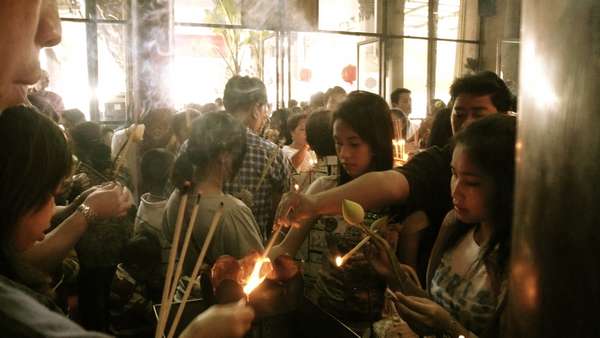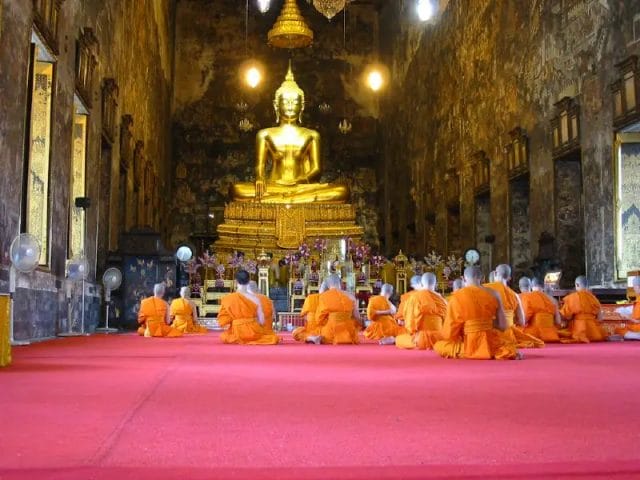Makha Bucha Holiday in Thailand
Last Updated on August 28, 2017
[Magha Puja](http://en.wikipedia.org/wiki/Magha_Puja) (มาฆบูชา) (Makha Bucha) is an important Buddhist religious festival, celebrated in Thailand, Myanmar, Laos and Cambodia. Magha is a Pali and Sanskrit word meaning _the third lunar month_, and Puja is a word in the same language that means _to venerate or honor_. It is pronounced in Thai as _Makha Bucha_.
– Saturday, 11 February 2017
– Thursday, 1 March 2018
## Magha Puja Buddhist Festival
Magha Bucha celebrates a day nine months after the Buddha’s enlightenment. He was staying at a monastery in Veluvana, or the Bamboo Grove, near Rajagaha in northern India. On this day, the full moon day of the third lunar month, a thousand monks decided to visit him to pay their respects. Simultaneously, and without any advance warning, another group of 250 monks from various places, and under various leaders, also decided to visit him. The Buddha used this opportunity to give an important sermon, in which he laid down the three fundamental teachings of Buddhism. These are:
* Not to do evil
* To do good
* To purify the mind
## Makha Bucha in Thailand
Makha Bucha is observed in Thailand as a public holiday, and most Thai Buddhists will go to a temple to pay their respects to the Buddha. The daytime has people visiting the temples and performing merit making and listening to sermons. On the evening of Makha Bucha, candlelight processions or _wian tian_ of monks and lay people will circle the main hall of the temple clockwise three times. Each devotee will carry flowers, a candle and a lighted incense stick. The three circles symbolize the Three Jewels of Buddhism, namely the Buddha, the Dhamma (or teaching) and the Sangha (or monkhood).
Thai Buddhists perform _tam boon_ at their temple, making merit by taking part in temple activities and by contributing money, clothing, food and other gifts to the temple and its monks. Many people will attempt to observe the [Five Precepts](http://www.mbmc.iirt.net/books/bys007.htm), even if only for a few days. These are:
* To abstain from harming living things
* To abstain from stealing
* To abstain from sexual immorality
* To abstain from telling lies, from backbiting, gossip, and intrigue
* To abstain from all intoxicants.
In addition, some Buddhists will also observe a further three [precepts](http://web.singnet.com.sg/~alankhoo/Precepts.htm), which are:
* To abstain from eating after midday
* To abstain from singing, dancing and public entertainment, and wearing perfume or ornaments
* To abstain from using a high bed or soft chair.
Buddhists observing the eight precepts will normally wear white clothes, and many will eat only vegetarian food during this period. In line with the religious nature of this holiday, tourists will often find that bars are closed on Magha Puja day, and that many restaurants will not serve alcohol.
## The Thai King and Makha Bucha
Although all religions are tolerated in Thailand, Buddhism is the official religion of Thailand, and the King, as Head of State, takes part in special ceremonies on this day. He invites thirty monks to breakfast at the royal palace, after which they chant mantras and repeat the sermon of the Buddha. Following this the King will light 1,250 candles to represent the monks who were present on that special day 2,500 years ago. These ceremonies are usually broadcast live on TV.


Can you tell me, will the events etc be on Sunday (the day before the holiday) or on the Monday (the day of the holiday)? I’ve heard conflicting information and want to be sure I go on the right day. Thanks!
Where did you hear conflicting information? It is easy to find out, just go to the temple you want to visit and ask. Not sure why the events would be the day before the holiday? Someone might be teasing you.
I am living with my wife, Lam plai mat (Biriram) I was told I could teach at Lam plai mat school. Now they are saying because I have no teaching paper work they will not let me teach (work)
Can you help me because I want to stay with Thai people.
You need a TEFL teaching certificate and an undergraduate degree to teach in Government schools. If you already have an undergraduate degree, then you can get a TEFL at SEE TEFL (highly recommended).
Are there any special clothing they wear on this particular day